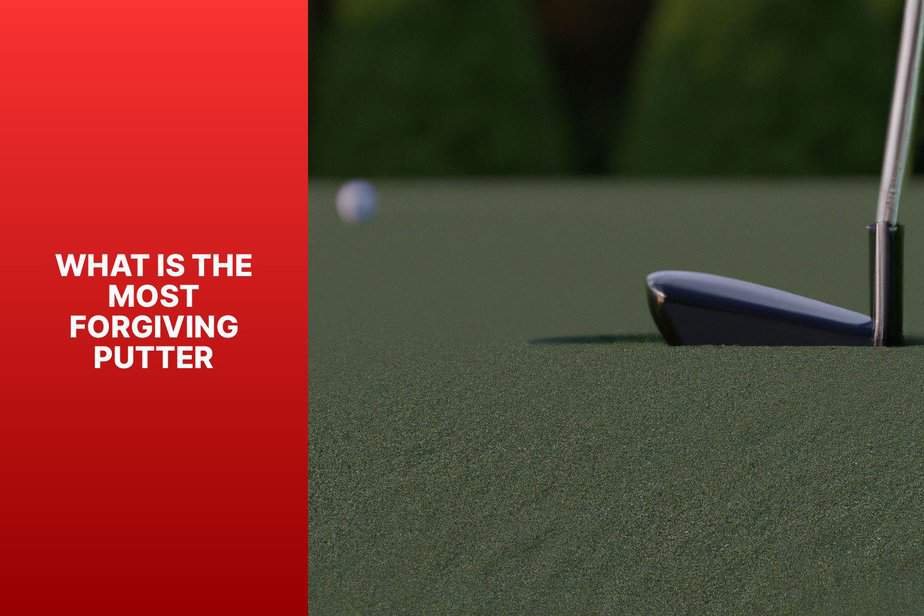Need a putter that won’t hold a grudge? Look for one with a high Moment of Inertia (MOI). This will provide stability and forgiveness on mis-hits. Clear alignment aids help you line up your putts accurately.
The Odyssey O-Works Red 2-Ball Putter is praised for its high MOI and alignment features. Its two-ball design helps with accuracy. The TaylorMade Spider X Putter has advanced weight distribution and perimeter weighting for enhanced forgiveness. The Ping Sigma 2 Valor Putter has a mallet-style design with perimeter weighting and a dual-durometer insert.
Choose a putter with high MOI, clear alignment aids, and stable weight distribution to improve your putting. These forgiving putters can help you maintain accuracy and stability – even when your stroke isn’t perfect. Take your game to the next level!
What is a forgiving putter?
Forgiveness in a putter is a must-have for golfers. It reduces the effects of poor contact, off-center hits and mishits, resulting in more accurate putts. When selecting a forgiving putter, consider features like the alignment aids. These include lines or dots on the head, which aid golfers in lining up their shots. High-MOI designs also help, distributing weight around the perimeter for stability and reduced twisting. Lastly, grooves on the face can impart a consistent forward rotation for better accuracy and distance control.
Pro Tip: Test out different putters, paying attention to how they feel in your hands. A comfortably weighted putter with a balanced swing can improve your performance on the greens.
Why is forgiveness important in a putter?
Forgiveness is a must when selecting a putter. It helps you to make up for errors in your stroke, giving you accuracy and consistency on the green. This lets you keep control of your shot, even if you don’t hit it perfectly flush. This attribute is essential for putting, as precision and finesse are key for success.
A putter lacking forgiveness makes minor inconsistencies in swing path or contact point have a huge impact on the outcome of the putt. Without it, these small errors can lead to missed putts or poor distance control. You would be stuck with inconsistent results, frustration and decreased confidence.
A forgiving putter fixes all this. It has features like perimeter weighting that redistribute weight around the clubhead, creating a larger sweet-spot and reducing twisting on impact. This means that even mishits can result in smoother rolls and more accurate outcomes.
Face-insert technology is also used in some forgiving putters. This involves inserting materials with different densities into the clubface to optimize feel and response across a wider area, making up for off-center hits and improving overall consistency. This expands the effective striking zone, giving golfers more forgiveness and still maintaining an optimal level of performance.
Pro Tip: When selecting a forgiving putter, take into account your personal preferences and playing style. Test various models to find one that suits your stroke mechanics and instills confidence. Remember that forgiveness is key for improving accuracy and consistency on the greens.
Factors to consider when choosing a forgiving putter
When it comes to choosing a forgiving putter, there are several factors to consider. These can affect your performance on the green and determine success as a golfer. Here are six points to keep in mind:
- Alignment aids like lines or dots on the top of the clubhead.
- MOI (Moment of Inertia) for resistance to twisting off-centre hits.
- Face insert materials like soft polymer or milled steel for improved forgiveness and smoother roll.
- Weight distribution for stability on mishits.
- Length and grip for proper posture and control.
- Personal preference for comfort and suitability.
Golfers may prioritize certain factors based on their individual needs and skill level. Beginners may benefit from alignment aids and forgiveness technology; while experienced players may focus on feel and responsiveness.
Forgiving putters have evolved over time. Early designs lacked many elements now standard. Alignment aids, MOI optimization, face insert technology, etc. have been refined, resulting in modern putters with improved performance and ability to overcome mis-hits.
By considering these factors when selecting a putter, golfers can find one that offers forgiveness and better performance. So your putt might as well be forgiven!
Most forgiving putters on the market
When it comes to putters, there are a few which stand out for their forgiveness and precision. Let’s take a look at some of the best options!
| Putter Model | Forgiveness Rating | Price Range |
| Ping Sigma 2 Tyne Platinum Putter | 4/5 | $200-$250 |
| Odyssey O-Works Red #7S Putter | 5/5 | $350-$400 |
| TaylorMade Spider X Copper Putter | 4/5 | $259-$349 |
Finding the perfect forgiving putter is like searching for a mythical creature – but we can help you find the right one!
Choosing the right forgiving putter for you
Weight? Check! Forgiveness? Check! Alignment aids? Double-check! When choosing a forgiving putter, these are all must-haves. But, don’t forget to consider other details, such as shaft length, grip style, and your own personal preferences. With so many options out there, it can be daunting. Take the time to research and test various options to get the right one for you. Your golf game deserves it! After all, finding the perfect forgiving putter is like seeking a unicorn that never misses its horn – rare, yet totally worth it.
Conclusion
We have investigated what makes a putter forgiving. Professionals agree that certain factors determine its effectiveness. Weight distribution and alignment aids are key elements. They enhance stability and accuracy during the putting stroke. The material of the putter also matters; softer materials absorb vibrations better.
Historically, blade-style putters were popular. But as technology advanced, mallet-style putters with larger heads became more common. They aimed to give golfers of all skill levels more stability and forgiveness.
When selecting a forgiving putter, it’s important to understand the various factors and their history. That way, golfers can make a wise decision that suits their individual needs. Choose carefully – or else your wallet might need forgiveness!
Final Thoughts
Discovering the most forgiving putter is all about balance between forgiveness and precision. The takeaway? Choose a putter that fits your putting style and minimizes mishits.
Factors like MOI and weighting must be taken into account when considering forgiveness. High MOI putters are better for off-center hits, reducing the impact of mishits. Also, weighting on the perimeter enhances stability and stops any twisting at impact.
No putter will work for everyone. Each golfer has their own stroke and preferences. Some may like mallet putters with large heads and alignment aids. Others may prefer blade-style putters for a traditional feel and more command over distance.
It’s best to try out different putters before deciding. Notice how they feel in your hands, how they line up with your target, and how consistent you are with them. This personal experience is the key to finding the most forgiving putter.
Bonus: Forgiveness isn’t the only factor when selecting a putter. Feel, alignment aids, and confidence also play a role. Have fun!
Frequently Asked Questions
FAQs on “What is the most forgiving putter?”
1. What does it mean for a putter to be forgiving?
A forgiving putter is designed to reduce the negative effects of mishit putts. It typically has a larger sweet spot, offering more forgiveness on off-center strikes.
2. How does a forgiving putter improve my putting?
A forgiving putter helps you maintain more consistent ball speed and direction even on slight mishits. This can lead to better distance control and increased accuracy on the green.
3. What features should I look for in a forgiving putter?
Look for a putter with a high moment of inertia (MOI) as it helps resist twisting on mishits. A larger head, perimeter weighting, and a mallet-style design are also characteristics of forgiving putters.
4. Can a forgiving putter help me if I have an inconsistent stroke?
Yes, a forgiving putter can be beneficial if you have an inconsistent stroke. Its forgiveness can compensate for slight errors in your putting motion and still provide good results.
5. Are there any drawbacks to using a forgiving putter?
Some golfers may find forgiving putters less responsive on perfectly centered strikes, leading to a loss of feel. Additionally, forgiveness may come at the expense of feedback, which some players prefer.
6. Which putter models are known for their forgiving nature?
Brands like Odyssey, TaylorMade, and Ping have putter models renowned for their forgiveness. Examples include the Odyssey 2-Ball, TaylorMade Spider, and Ping Sigma G series.
Liam Drake, an avid golfer and seasoned outdoor enthusiast, brings his passion for the greens to his golfing blog. With years of experience swinging clubs and exploring courses around the world, Liam shares his insights, tips, and personal stories to inspire and guide fellow golf lovers. Whether it's breaking down the latest gear, navigating challenging courses, or just sharing a memorable round, Liam's blog is a treasure trove for anyone who shares his love for the game.
Address: 1 S Grove St, 43081, OH, USA

